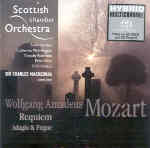Charles Mackerras leads a swift and urgent reading of the Requiem, predictably fine in the orchestral department and well sung by the chorus. The soloists (especially the men) are less satisfactory. Peter Rose doesn’t sound terribly imposing in the Tuba mirum, and tenor Timothy Robinson’s reedy timbre suits Mozart’s music about as well as ketchup on ice cream. Susan Gritton does the best work, which is just as well as she also gets the best music to sing. The edition used is Robert Levin’s, if this matters to you (I find all editions of this work unsatisfactory in varying degrees), but the entire project is compromised by surprisingly inadequate sonics.
When heard in multichannel format, the chorus sounds too far behind the orchestra, and this seriously compromises what otherwise would be pretty thrilling accounts of the Dies irae and Confutatis. Weirder still, the soloists seem to hover in mid-air out in front of and above everyone else, their voices swimming in the acoustic of Caird Hall, Dundee. In short, this certainly isn’t bad as far as Mozart Requiems go–it’s average or a bit above; but technically it’s not up to Linn’s usual high standard.
































